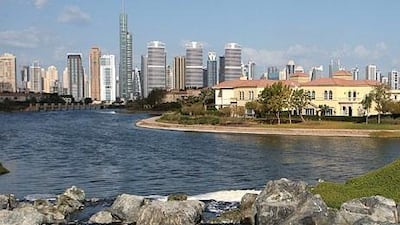The Central Bank has signalled it may be willing to compromise over its plans to introduce limits on mortgage borrowing.
Lenders’ concerns about the legislation to cap mortgage lending to borrowers will be considered at a meeting of the Central Bank’s board next month, said a spokesman for the regulator, who spoke on condition of anonymity.
The Central Bank “may be willing to reconsider the limits”, he added.
“It’s up to the board. They will consider the requests but there has to be good reason why they’re requesting the grace period and raising sufficient limits.
“They [the UAE’s banks] have to have evidence it will hurt the property market. The Central Bank is focused on financial stability but they may have a different interest,” said the spokesman.
The Central Bank's announcement on New Year's Eve sent a wave of uncertainty through the property market. Its circular, to banks and other financial institutions, sets forth new rules that limit expatriate borrowing to 50 per cent of the value of the first house and 40 per cent for any further properties.
Limits for mortgage lending to Emiratis were set at 70 per cent for the first house and 60 per cent after that.
Following a meeting about the new legislation on Sunday, members of the Emirates Banks Association, which represents lenders, agreed to send a letter to the regulator asking for a 30-day extension to prepare for the rules.
The lenders are also expected to appeal for a softening of the limits, otherwise known as loan-to-value rates.
The new legislation is aimed at curbing the frenzy of property buying and selling that helped to sow the seeds of the property bubble that developed before 2008. The global financial crisis halted a glut of lending as borrowers defaulted on mortgage repayments and prices crashed by more than half.
But analysts warn the New Year’s Eve changes may hinder the fledgling recovery in the property sector as well as curtail bank earnings.
The regulator has in the past agreed to give banks breathing space over controversial rule changes.
In April it told commercial lenders that loans to governments and their holding companies should not exceed total capital and gave banks six months to comply. But following stiff resistance from the industry, the watchdog’s board last month said it was postponing the changes to allow time to consult with institutions.
The spokesman said the latest rule changes were also not set in stone.
“They will be reconsidered after six months and if they [the mortgage caps] need to be raised to help the economy they will be,” he said.
Sanyalaksna Manibhandu, a banking analyst at National Bank of Abu Dhabi, said any sign the regulator might be ready to ease the legislation was positive.
“It could be a case of floating the trial balloon to see how banks react before consulting them,” he said.
“There is a danger of making new rules a bit restrictive and risking stopping banks from growing profits.”
A fresh warning of the impact of the limits emerged yesterday.
Jones Lang LaSalle, the property consultant, said the cap and the significant levels of new supply scheduled this year were “likely to limit price increases below the levels witnessed in 2012”.
Better Homes, the country’s biggest property broker, said on Sunday that it could lose as much as a quarter of its trade if the new mortgage lending caps stood.

